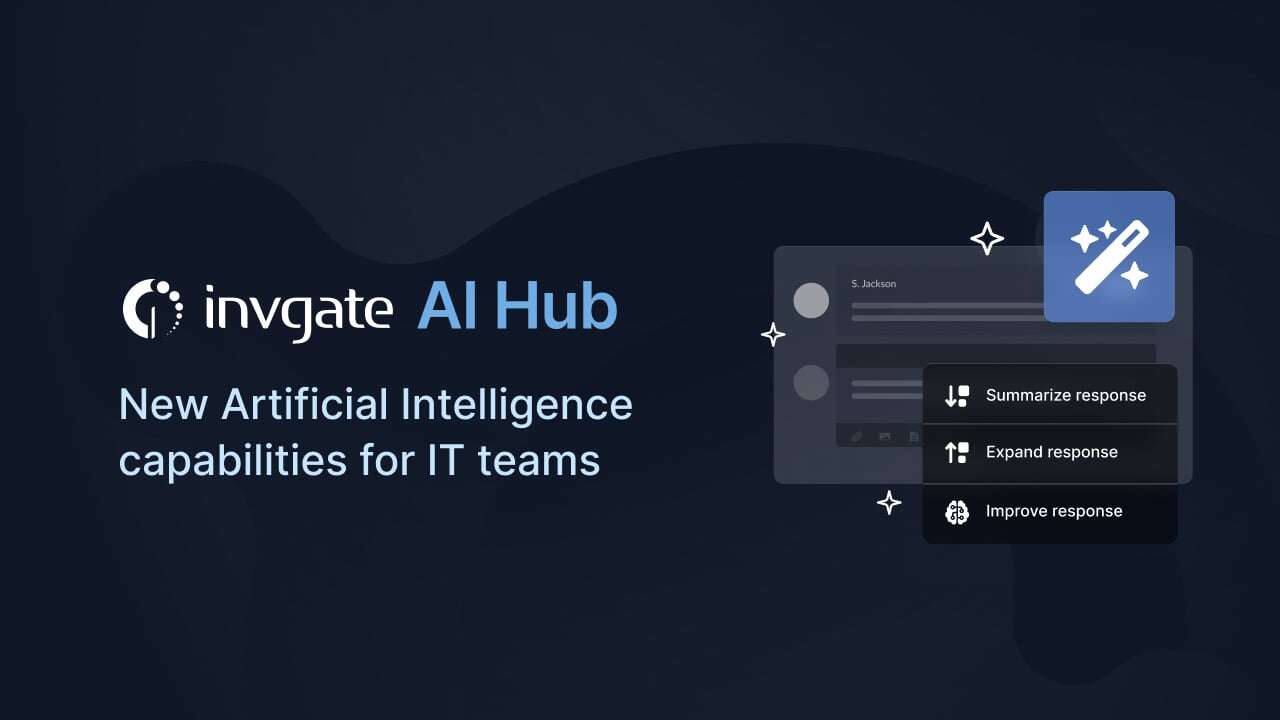KCS best practices are the key to making Knowledge-Centered Service (KCS) work. This proven methodology helps teams capture and improve knowledge as they solve issues, turning everyday support into a continuous learning process.
To help you put it into action, we gathered expert insights from the November Ticket Volume - IT Podcast webinar, featuring Liz Bunger (Motive) and Michelle Stumpf (Celonis). Along with host and InvGate Product Specialist, Matt Beran, they shared what actually works when building a KCS culture that sticks.
Whether you’re new to KCS or looking to improve adoption, these tips go beyond theory to help you get real results.

13 KCS best practices
Adopting KCS is about shifting how teams think, share, and work together. These tips are based on real-world experience and go beyond theory to tackle the everyday challenges of implementation.
Here’s what you should focus on:
- Lead with transparency and clarity
- Tailor the message: What’s in it for me?
- Prioritize “good enough” knowledge
- Write for humans, not manuals
- Use AI wisely, not blindly
- Coach, don’t control
- Expand KCS beyond IT
- Choose tools that support real-time work
- Foster a culture of contribution
- Track meaningful metrics
- Nurture the program continuously
- Scale with intention
- Learn from the KCS community
#1. Lead with transparency and clarity
One of the most common reasons KCS programs struggle is a lack of clarity. People don’t adopt what they don’t understand. That’s why leading with transparency and a clear explanation of roles, expectations, and benefits is essential to setting the stage for success.
Michelle highlighted how crucial it is to explain the full KCS process, from beginner roles like candidates to more advanced ones like knowledge domain experts, and to do it in plain terms:
“Lead with transparency, right? Describe the process from end to end […] The transparency is really key […] not making anything heavy or cumbersome. Share all the wins and successes with everyone. Make everybody feel good about their contributions.”
Michelle Stumpf, Head of Knowledge Management at Celonis
The goal is to demystify the methodology and help everyone feel part of it from the beginning. Whether someone is contributing knowledge or simply using it, they should know what their role is and how they fit into the bigger picture. That sense of clarity builds trust — and trust drives adoption.
2. Tailor the message: What’s in it for me?
To get people on board with KCS, you need to speak their language. What motivates an agent is different from what matters to a manager or executive. Frame the benefits in a way that resonates with each group, from saving time and reducing interruptions to improving KPIs or customer satisfaction.
“It’s all about the ‘what’s in it for me,’ and the ‘what’s in it for me’ is very different for your agents than it is for the managers, than it is for the directors and the CIO.”
Liz Bunger, KCS Program Manager at Motive
A one-size-fits-all pitch won’t cut it. The more relevant your message, the more likely people are to engage.
3. Prioritize "good enough" knowledge
KCS is about capturing knowledge as work happens. The priority should be sharing helpful, accurate information quickly, even if it’s not polished.
The idea is to get knowledge out there fast so others can use it, improve it, or build on it. Don’t let the pursuit of perfect content slow down progress. "Good enough" is often exactly what people need.
4. Write for humans, not manuals
KCS content isn’t technical documentation. It’s practical, real-time knowledge meant to solve problems quickly. Articles should be short, clear, and written in a way that anyone can understand, even under pressure.
As Liz Bunger put it:
“Knowledge should be a quick question and answer. Somebody asked the question; here is the answer. And it should be easy to consume. […] They don’t have time to read a full piece.”
Liz Bunger, KCS Program Manager at Motive
The focus should always be usability over formality. If people can’t apply it quickly, they won’t reuse it (and that defeats the purpose).
5. Use AI wisely, not blindly
Artificial intelligence (AI) can be a powerful ally in KCS — helping generate article drafts, simplify language, or identify outdated content. But it should never replace human judgment. Automated content still needs to be checked for accuracy, tone, and context before it’s trusted.
Think of AI as a way to save time on repetitive tasks and support contributors, not as a shortcut to skip essential thinking. When used intentionally, AI can boost quality and speed without compromising trust.

6. Coach, don’t control
KCS adoption thrives in a supportive environment — not one focused on oversight and correction. Instead of enforcing strict reviews or nitpicking grammar, use peer-to-peer coaching to guide contributions.
Coaches can help teammates improve their knowledge articles while keeping things positive and practical. This approach builds confidence, encourages participation, and avoids turning KCS into just another box to check.
7. Expand KCS beyond IT
While KCS originated in support teams, its value doesn’t stop there. Any department that answers questions, solves problems, or provides services can benefit from structured knowledge sharing. HR, finance, legal, product teams — all can contribute to and use knowledge to work more efficiently.
Expanding KCS beyond IT also reinforces a culture of collaboration and continuous learning across the organization. Start with support, but think bigger as your program gains traction.
8. Choose tools that support real-time work
For KCS to truly integrate into daily operations, knowledge creation and reuse must happen in the flow of work (not as an extra step). That’s why it’s critical to use tools that allow agents to link, update, or create articles directly from their support platform.
When knowledge work feels disconnected from day-to-day tasks, adoption drops fast. But if it’s embedded naturally into existing processes, it becomes second nature. The right tools reduce friction, support consistency, and make it easier to keep knowledge fresh and relevant.
9. Foster a culture of contribution
Many people hesitate to share knowledge because they fear being judged or think their input isn’t good enough. That’s why it’s essential to create a supportive environment where contributing is safe, valued, and encouraged.
Michelle highlighted this fear and the importance of addressing it:
“I'm afraid of being judged about how I write, what I've written, or being exposed where people thought I knew something that perhaps I didn't know. [...] We're not looking at those nitty-gritty details.”
Michelle Stumpf, Head of Knowledge Management at Celonis
When people feel free to contribute without scrutiny, they’re far more likely to engage—and that’s when KCS truly starts to thrive.
10. Track meaningful metrics
Measuring success in KCS goes beyond counting how many articles were created. Focus on metrics that really reflect value — like participation rates, article reuse, and improvements in support KPIs such as First Contact Resolution or CSAT.
The right data can tell you what’s working, where coaching is needed, and how knowledge is impacting the broader organization. Just be careful not to overemphasize volume. It’s not about how much content you have, it’s about how useful and used it is.
11. Nurture the program continuously
KCS needs ongoing attention to stay alive. This means coaching, maintenance, feedback loops, and regular reinforcement. Without it, knowledge gets stale, contributors lose interest, and the culture you’ve built starts to fade.
Keeping the program healthy means checking in often, recognizing wins, and making sure the system still supports your team’s real needs. A thriving KCS program is a living thing, don’t let it run on autopilot.
12. Scale with intention
Start small, but plan for growth from the beginning. KCS works best when it’s rolled out in waves — giving each team time to adopt the process, build confidence, and share feedback. A phased approach also helps fine-tune your coaching strategy and tool setup before expanding further.
But even as you start with a limited group, keep the bigger picture in mind. The goal is to create a scalable framework that can eventually support the entire organization, not just a single department.
13. Learn from the KCS community
You don’t have to figure everything out on your own. The KCS community is full of experienced practitioners, templates, case studies, and resources that can save you time and help you avoid common mistakes.
Organizations like the Consortium for Service Innovation, LinkedIn groups, and peer networks offer valuable insights and support. Lean into that collective knowledge — after all, that’s exactly what KCS is about.
Final thoughts
Introducing the KCS methodology will help organizations level up their Knowledge Management processes by putting at in the center of operational efficiency.
And as Liz and Michelle made clear during their Ticket Volume conversation, success comes from building the right habits, supporting your team, and staying flexible as the organization grows.
These 13 KCS best practices are your foundation. Start small, adapt as you go, and don’t be afraid to lean on the broader KCS community. The more you involve your team, celebrate contributions, and prioritize usable knowledge, the more value you’ll unlock.
Want more insights like these? You can listen to the full conversation on Apple Podcasts, Spotify, YouTube, or your favorite podcast platform.















